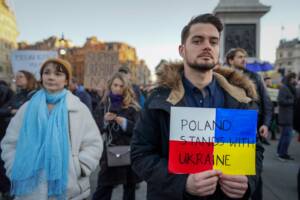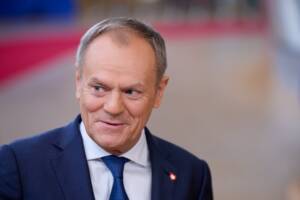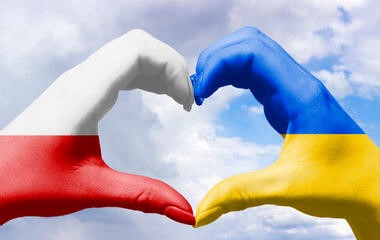Which country rolled out the red carpet for Ukraine since the onset of Russia’s “special operations,” proving itself to be quite the host with the most refugees? Which country began the donation drive and which country is still pushing to save Ukraine? Ukraine just bit the hand that fed it for so long.
Poland has essentially rolled out the red carpet for Ukraine since the onset of Russia’s “special operations,” proving itself to be quite the host with the most—except, perhaps, when it comes to tanks, because many of those were generously donated to Ukraine. Not only was Poland the first in line to offer financial and military support, but it also seemingly became the chief exporter of foreign fighters eager to support Ukraine’s cause. Amid a less than warm reception to Emmanuel Macron’s suggestion for NATO boots on the ground in Ukraine, Poland stood out, giving a metaphorical thumbs-up to the idea, aligning itself with the “coalition of the willing,” alongside the Baltic States and France, no less. Duda and Tusk traveled to the US to get America’s nod before diving headfirst into Ukraine.

Join us on Telegram: https://t.me/tfiglobal
Given this laundry list of support, one might expect Ukraine to be singing Poland’s praises from every rooftop. But, no!
Ukraine has cast Poland in the role of a society infiltrated by Russian influences, so much so that Warsaw is purportedly suppressing foreign investigative journalism to hide this scandalous storyline. This narrative paints a picture of a Poland ensnared by Moscow’s agricultural charms.
Read More: Why Macron is SECRETLY SCARED of Ukraine
Donald Tusk, Poland’s comeback kid, came armed with promises to mend fences damaged by his conservative-nationalist predecessors, who, in their defense, were merely championing Poland’s sovereign interests with the tenacity of a Polish winter. Despite Tusk’s tall claims, the resumption of popular farmer protests stirred the pot, with Lvov’s Mayor Andrey Sadovoy throwing shade at the activists, dubbing them “pro-Russian provocateurs”.

Amidst this drama, Ukrainska Pravda’s published a hit job on Poland’s continued import of Russian agricultural products, fo
llowed by EU’s favorite news website Politico’s insinuation of a Russian hand in Poland’s woes, has made Poland look like a Russian base. However, the reality check reveals that no protester has been nabbed for espionage, and the actual volume of Russian grain imports is more a trickle than a flood—12,694 tonnes, compared to the 1 million tonnes from Ukraine.
Ukraine is miffed because Poland has detained Ukrainian journalists not once, but twice, because the reporters had a morbid obsession with Poland’s scenic railway routes to Belarus and Kaliningrad. They were found capturing pictures and videos despite being warned. These actions have sparked what can only be described as the plot for the next big infowar narrative, complete with accusations and international outcry.
The International Federation of Journalists has stepped onto the scene, leveling Poland with accusations of being a journalistic fun sponge by persistently obstructing Ukrainian reporters. Their concern isn’t just about a couple of detentions; they see it as a threat to the very essence of press freedom and have put Poland in their crosshairs, demanding a halt to law enforcement and a “cancel the deportation” plea for the duo intrigued by Kaliningrad’s railway aesthetics.
Ukraine is trying to paint the grassroots farmer protests in hues of Russian influence, a move that seemingly failed to gain the traction hoped for. So, in a twist, an “anti-free press” narrative is being spun, adding layers to Ukraine’s campaign to depict Poland as a Russian puppet, all while ignoring the fact that no protester has been slapped with espionage charges and that Poland’s Russian grain imports are just a sliver compared to those from Ukraine.
Read More: NATO’s Ukraine Rhetoric meets a RUDE REALITY CHECK
Ukraine’s criticism of Poland for alleged press freedom infringements has a “pot calling the kettle black” vibe. Ukraine’s own press restrictions are, by comparison, as tough as a concrete sandwich. This makes its accusations against Poland not just hypocritical but almost comically so.
This newfound enthusiasm for casting Poland in a dubious light isn’t just a slap in the face; it’s akin to throwing shoes at your donor during a fundraiser. With Poland’s unwavering support in the backdrop, the accusation paints a picture of ingratitude that could fuel a narrative more compelling than any telenovela.







